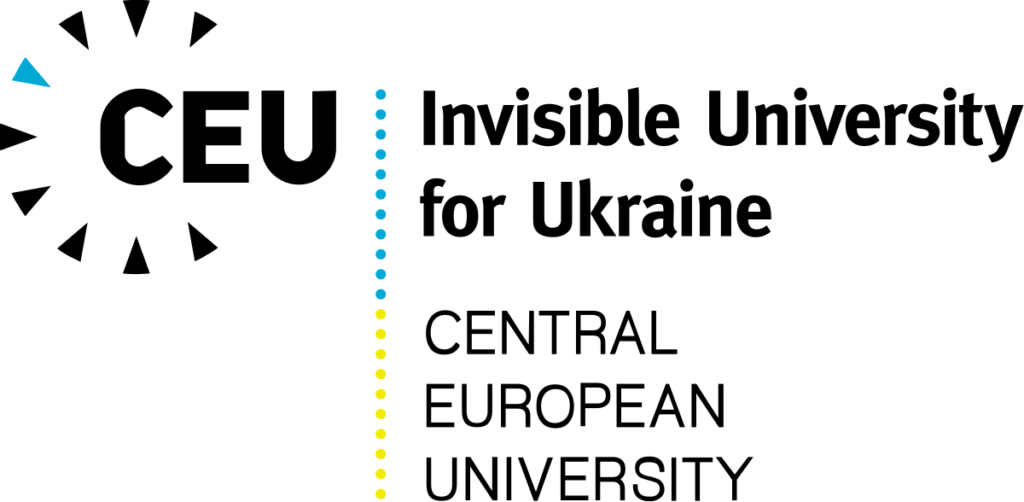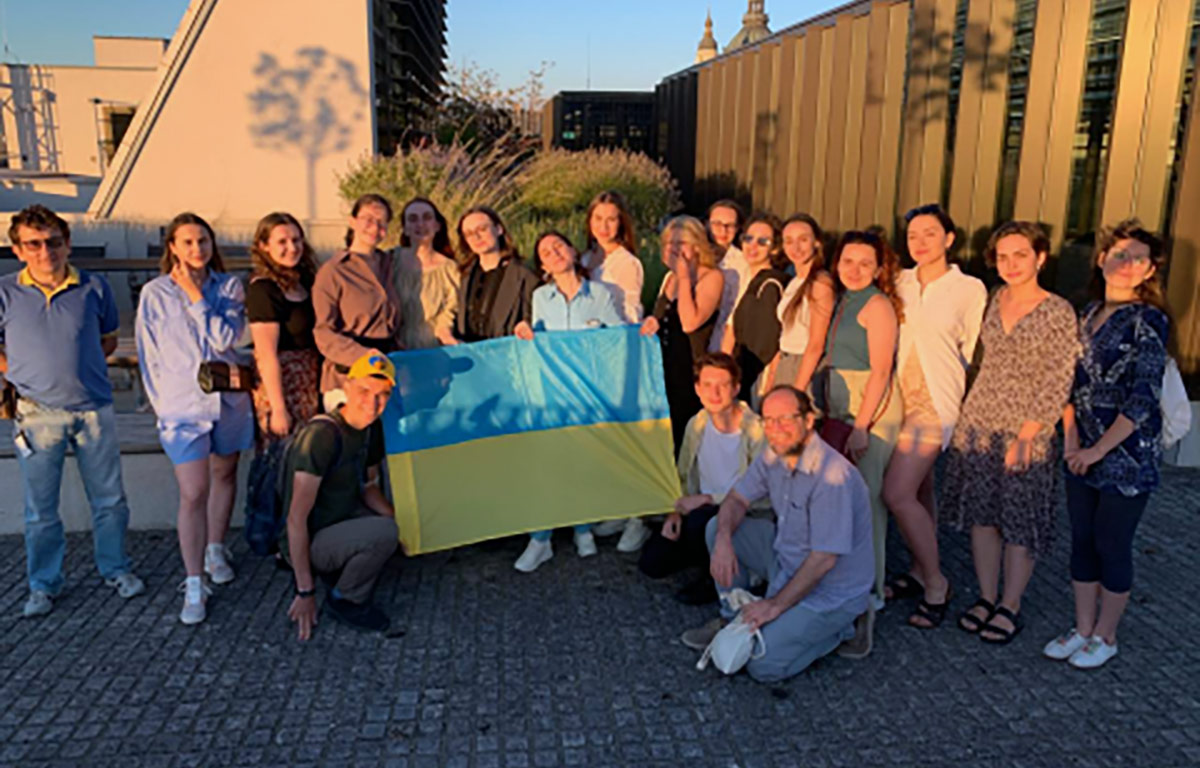
The Invisible University for Ukraine (IUFU) is a certificate program (offering ECTS credits) for junior and senior undergraduate (BA) and graduate (MA and PhD) students from Ukraine, whether residing in Ukraine or in refuge, whose studies have been affected by the war. The name of this transnational solidarity program evokes the various nineteenth and twentieth-century underground and exile educational initiatives (such as the “flying universities”) in Eastern Europe, as well as the tradition of Invisible Colleges formed after 1989 in the region.
The program offers an intensive learning experience on the role of Ukraine in changing European and global contexts, placing questions relevant for Ukrainian students into a transnational comparative perspective. The program is not meant to replace or duplicate the existing education opportunities in Ukrainian universities, but to support them by filling the lacunae that temporarily emerged due to the Russian invasion. By strengthening the ties of Ukrainian educational institutions, as well as scholars and students, to transnational networks, we hope to counter the destructive effects of brain drain through creating access to educational infrastructure and academic knowledge for students irrespective of their current location. The program is designed in a hybrid format (online teaching with a possibility of shorter on-site visit to Budapest in the form of a winter and summer schools).
The program is implemented by Central European University (Budapest Campus), in cooperation with Ukrainian (Ivan Franko National University of Lviv and Ukrainian Catholic University), EU-based (Imre Kertész Kolleg at the University of Jena) and international (Department of Political Science and Management, University of Agder, Kristiansand, Norway) university partners.
IUFU is supported by the Open Society University Network, with co-funding from the Deutscher Akademischer Austauschdienst (DAAD), as well as the John D. and Catherine T. MacArthur Foundation.
The educational program is comprised of three components:
- online thematic lecture courses (in the humanities and social sciences),
- mentoring (in English and Ukrainian)
- skill-building (academic English, academic writing) and career support for future education.
The program is taught by prominent scholars linked to the Central European University (including members of its faculty, as well as researchers of CEU Democracy Institute and the Open Society Archives), Ukrainian and German partner institutions, and internationally renowned specialists of the topics from East Central Europe, Western Europe, and North America. The mentoring is offered by advanced doctoral candidates from these institutions.
Courses
IUFU offers a trans-disciplinary core course that can be taken by students with different backgrounds and six further courses in four thematic tracks (History, Culture and Heritage Studies, Society, Politics and Law). Each course consists of 12 sessions (100 minutes); equal to 4 ECTS credits. Courses will be taught online in late afternoons (Central European Time) once a week per class. Mentoring and Academic English classes are open for those who take at least one thematic course or the core course.
2022 Fall
Core Course
Ukraine: Imperial, Soviet, Independent, European
Six thematic courses
- History of Public Sphere in Ukraine and East Central Europe
- War, Memory, and the City. Shaping Collective Remembrance and Re-Articulation of Past in Ukraine in European Contexts
- Ideologies on the Move: Transnational Ideas in Local Intellectual Cultures
- Migration, Displacement and (Trans)National Solidarities in Ukraine in the Global Contexts
- Heritage-Based Post-War Urban Reconstruction in Ukraine
- Ukraine in/and Europe: Frameworks of European Integration
2022 Spring
- Symbolic Geography, Contested Identities and Mass Violence: Ukrainian History in European Contexts
- Culture and Heritage Studies
- Between Norms and Realities: Challenges to Europeanization, Democratization and the Rule of Law in a Transnational Context
- Transformation, Conflict, and Migration: Study of Exceptions from Rules, Vulnerability to Risks and Unacceptable Conditions
Winter School 2023
Evidence and Truth – Reflecting on the War in Ukraine in a Global Context
21–29 January 2023
The winter school of IUFU hosts 25 selected participants from the cohort of current IUFU-students. It is held at the Budapest campus of CEU, with personal attendance, creating a community for the students who come from different regions and institutions. The winter school reflects on the key intellectual problems raised by the ongoing war and the specific challenges facing students and scholars when they seek to reflect on processes happening in “real time.” We focus on the problems related to collecting and evaluating evidence and the need to develop strategies of verifying and evidencing truth on multiple levels – in view of the destruction of cultural heritage, war crimes, Russian propaganda campaigns, ongoing social processes such as migration and displacement, as well as the complexities of national and local identity.
Summer School 2022
Making Ukraine Visible – Images, Narratives, Institutions
Summer School in Budapest and Lviv, 10–19 July
35 selected participants from the cohort of IUFU-students participated in the summer school, held parallelly at CEU Budapest campus and the Ukranian Catholic University campus in Lviv. Participating students reflected on how Ukrainian culture, identity, and institutional practices can be valorized in the global discussion and how resilient civic and academic organizations can be created and maintained in the face of different threats, coming from external oppression, or from dysfunctional, hybrid or openly authoritarian regimes. Students also discussed audiovisual and teaching materials that could articulate their voice in the debate about postwar Ukraine both internally and externally and were invited to design the curriculum for different possible courses on topics they considered the most relevant.

The detailed program can be found here.
Main Organizers of IUFU
Ostap Sereda
Program director, Associate Professor in History at the Ukrainian Catholic University in Lviv and recurrent guest professor at CEU.
László Kontler
CEU Professor, History, Acting Rector of Közép-európai Egyetem → More info
Vladimir Petrovic
Research Professor, Institute of Contemporary History, Belgrade, and CEU Democracy Institute → More Info
Joachim von Puttkamer
Professor in History at the Friedrich Schiller University of Jena and Director of the Imre Kertész Kolleg
Nazar Stetsyk
Associate Professor, Department of Theory and Philosophy of Law, Ivan Franko National University of Lviv.
Balazs Trencsényi
CEU, Professor, History Department, lead researcher of History WG, CEU Democracy Institute
Renáta Uitz
CEU Professor, Legal Studies, Co-Director of CEU Democracy Institute